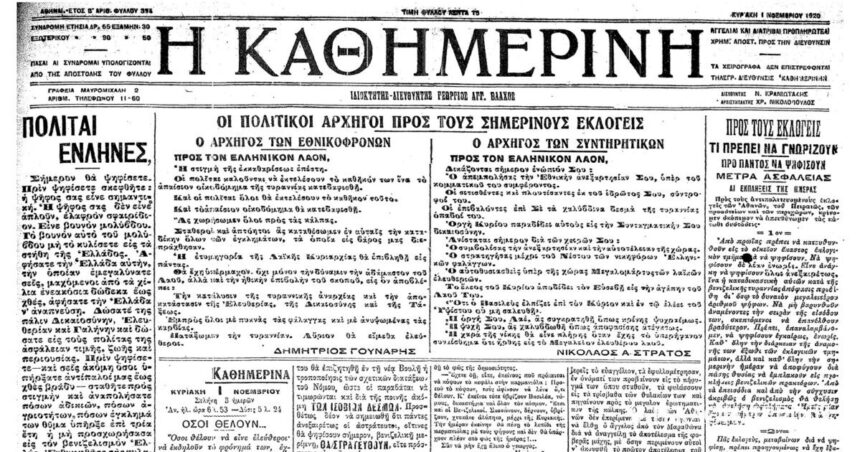In the summer of 1920, Greece experienced its greatest glory. Seven years after the Treaty of Bucharest, which confirmed Greek sovereignty over Macedonia, Epirus and Crete (sovereignty over the islands of the NE Aegean was linked to the issue of Northern Epirus and was settled by the Great Powers in 1914), the Greece once again expanded its borders to Thrace and western Asia Minor, developing into a powerful country in the Eastern Mediterranean region. “Greece of two continents and five seas” was now a fact. The prime minister of the country, Eleftherios Venizelos, played a decisive role in the integration of the unredeemed areas into the national body.
Greece’s success at Sèvres was marred by the assassination attempt on him by two anti-Venezuelan officers at the Lyons railway station in Paris. The victim of the acts of revenge for the attempt against Venizelos was the politician and diplomat Ion Dragoumis. The situation inside was drawn out.
Returning from France, Venizelos announced elections for October 25/November 7, 1920. The last elections in the country had been held in the “distant” 1915 and already the lifetime of the “Parliament of Lazarus” had been extended three times. Venizelos announced that the elections would be held under his own supervision and not under any caretaker government. Efforts were made to normalize political life: martial law and censorship were abolished. Leading figures of the anti-Venezuelan scene were then allowed to return to Greece, such as Dimitrios Gounaris, who landed in Corfu in October 1920 and then engaged in his election campaign.
The “United Opposition” based its election campaign mainly on two issues: firstly, the tyranny that the country suffered from Venizelos and secondly, the return of Constantine I, who had abdicated in favor of his second son, Alexander in 1917. The anti-Venizelist opposition, at the same time, made efforts to win the confidence of the Entente forces as to its attitude in case it came to power.
On the other hand, Venizelos’ Liberal Party based its campaign on two proposals. The first concerned the national question, which the Venezuelan side prided itself on having already settled, although it knew the difficulty of the undertaking in Asia Minor. The second contained elements of an apology for the mistakes that had been made during the period of the Venezuelan government. They were, in fact, attributed to the era in which they occurred, that is, a period of war conflicts and acute division.
The elections were postponed until 1the/14the November due to the early death of King Alexander. The message of Kathimerini on election day was clear. “Today you will vote. Before you vote, think: your vote is important. Your vote is not a simple, light pellet. It’s a mountain of lead,” the anti-Venezia-aligned newspaper said in its editorial. Continuing and overemphasizing the sacrifices of Hellenism for the liberation of the unredeemed Greeks, “Kathimerini” pointed out the need for the country to return to normal rhythms. “You left this Greece, which you magnified, fighting from nineteen twelve until yesterday, you left Greece to breathe. Give her Justice, Freedom and Peace again and give her citizens security of honor, life and property. Before you vote – and those of you who were our opponents until last night – stop for a moment and remember how many injustices, how many atrocities, how many crimes Greece, which did not join Venizelistism, was the victim of for three years.”
The election result surprised everyone. The Liberal Party suffered a crushing defeat capturing only 118 seats out of a total of 369. The Venezuelan seats in the new Revisionist Parliament came entirely from Thrace and the New Countries.
According to Venizelos, the defeat of 1her November was mainly due to fatigue from Greece’s almost eight-year participation in wars. The anti-Venizelians remained in power until the Asia Minor Catastrophe. They were overthrown by the military movement of September 1922, in which Nikolaos Plastiras and Stylianos Gonatas took the lead.
Column editor: Myrto Katsigera, Vassilis Minakakis, Antigone-Despina Poimenidou, Athanasios Syroplakis










